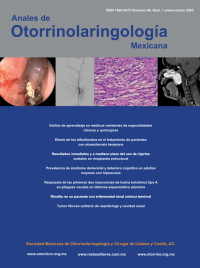
Effect of bisphosphonates in the treatment of patients with early otosclerosis.
An Orl Mex. 2023; 68 (1): 7-13. https://doi.org/10.24245/aorl.v68i1.8004
Ivette Carol Rodríguez-Revilla,1 Gonzalo Corvera-Behar,2 Cecilia Belén Espinosa-Arce,1 Miguel Alfredo García-De la Cruz1
1 Médico otorrinolaringólogo.
2 Neurotología y Cirugía de Base de Cráneo. Director.
Instituto Mexicano de Otología y Neurotología SC, Ciudad de México.
Resumen
OBJETIVO: Evaluar la eficacia de los bifosfonatos en el alivio o detención progresiva de la otoesclerosis temprana.
MATERIALES Y MÉTODOS: Estudio retrospectivo, observacional, descriptivo, realizado en el Instituto Mexicano de Otología y Neurotología. Se incluyeron pacientes con otoesclerosis temprana, hipoacusia superficial en tonos graves, en tratamiento con 35 mg de risedronato una vez por semana durante seis meses y audiometría al terminar el tratamiento. Para el análisis estadístico se calculó la prueba t de Student pareada.
RESULTADOS: Se incluyeron 20 pacientes: 12 mujeres y 8 hombres. La edad promedio fue de 44 años. En total se estudiaron 29 oídos: 16 derechos y 13 izquierdos. Vía aérea: promedio en tonos graves pretratamiento de 31.1 dB y postratamiento 24.1 dB (p < 0.05). Vía ósea: promedio en tonos graves 12.5 dB pretratamiento y 9.1 dB postratamiento (p = ns). Sin cambios significativos en promedios de frecuencias totales y en promedio de tonos puros en vía aérea y ósea debido a que los pacientes seleccionados en etapa temprana no tenían afectación en tonos medios y agudos.
CONCLUSIONES: Los bifosfonatos de tercera generación contribuyen a reducir la hipoacusia en fases tempranas de la otoesclerosis. Es necesario realizar estudios a largo plazo con controles periódicos para corroborar la mejoría o estabilización auditiva y estandarizar el tiempo óptimo de tratamiento.
PALABRAS CLAVE: Otoesclerosis; bifosfonatos; risedronato; hipoacusia.
Abstract
OBJECTIVE: To assess the efficacy of third-generation bisphosphonates in relieving or stopping the progression of superficial hearing loss of otosclerosis in early stage.
MATERIALS AND METHODS: A retrospective, descriptive study conducted at the Mexican Institute of Otology and Neurotology including patients with diagnosis of early otosclerosis and hearing loss in low tones who started treatment with risedronate 35 mg once a week for 6 months and audiometry at the end of treatment. Statistical analysis: paired Student t test.
RESULTS: There were included 20 patients: 12 women and 8 men. Average age was of 44 years; 29 ears were evaluated: 16 right side and 13 left side. Air conduction: low tones average pretreatment was 31.1 dB and post-treatment 24.1 dB (p < 0.05). Bone conduction: low tones average was 12.5 dB pretreatment and 9.1 dB post-treatment (p = ns). No significant changes were found in the average of all frequencies or in the pure tone average in air or bone conduction because our patients, being selected at the early stage of the disease, had no hearing compromise in medium and high tones.
CONCLUSIONS: Third-generation bisphosphonates contribute to reduce hearing loss in early stages of otosclerosis. Further long-term studies with periodic monitoring are needed to corroborate improvement or stabilization of hearing and standardize the optimal treatment time.
KEYWORDS: Otosclerosis; Bisphosphonates; Risedronate; Hearing loss.
Recibido: 25 de julio 2022
Aceptado: 10 de octubre 2022
Este artículo debe citarse como: Rodríguez-Revilla IC, Corvera-Behar G, Espinosa-Arce CB, García-De la Cruz MA. Efecto de bifosfonatos en el tratamiento de pacientes con otoesclerosis temprana. An Orl Mex 2023; 68 (1): 7-13.

